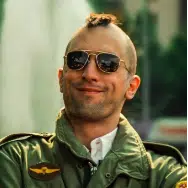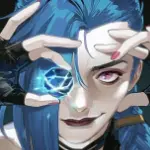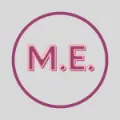
"Let's give the people what they want."
Harley Quinn says this phrase at a certain surreal/musical moment of the most—we can say it now—unfairly hated and dividing movie of the year. These words feel like a massive yearning of what never happened nor what we'll never see. Or, maybe, Todd Phillips intended this originally with the second movie, but all together didn't end up connecting with the audience and the critics as the first one did. The anarchy, rebellion and free violence sense reflected in Joker created a shocking social illusion right before everything plummeted just a few months prior to the start of the pandemic. The movie—which ended up winning two Oscars and appears to be a miracle in comparison to how people reacted to its sequel—seemed to have been sentenced to a continuation that's got nothing on Arthur Fleck's 2019 story.
Or, at least, the sequel didn't have the impact we would have liked since, for a week now, the only thing everyone is talking about is the indignation caused by everything surrounding Joker: Folie à Deux. Nonetheless, to understand this excessive anger, I believe it's crucial to go over the timeline of the disaster. Following, I'm going to explain everything that happened as of the announcement of the sequel.

June 7th, 2022. On his Instagram account, director Todd Phillips posted a photo in which Joaquin Phoenix was casually reading the finished script of a sequel that promised something… different, so to speak. The title Folie à Deux made us excited about the Joker—or actually this nobody who had inspired part of Gotham's population to spark off a rebellion and anarchism in the first movie—reuniting with his famous partner and romantic interest, Harley Quinn.
Almost two months later, in August of 2022, the director posted a short video in which Phoenix and Lady Gaga were seen dancing to the classic "Cheek to Cheek" by Irving Berlin. This suggested that the sequel was going to have a musical genre. No one imagined that, two years after that announcement, many people would fall asleep in the cinema when the characters started to repeatedly sing their different verses in several scenes. Phillips had warned the fans, but they didn't want to listen and blindly focused on bragging about the idea without thinking twice about how effective and innovative this would be.

December 10th, 2022. The director announced that the first day of shooting had finished with a dark and unsettling photo of someone shaving Arthur Fleck—supposedly a guard or someone from Arkham Asylum—and looking horrible due to its physical and psychological confinement. We later verified this condition during the sequels' first five seconds in which we see him extremely thin and practically in silence. Expectations were high. Everything seemed to point to a sequel that would explore the moral consequences of killing someone on live television while mixing music as "therapy" with psychological drama. The bet seemed to be much riskier, but come on, we love film challenges, don't we?
February 14th, 2024. On Valentine's Day, Phillips posted a photo in which we saw, for the first time, Lady Gaga's Harley Quinn next to Arthur—who had subtle makeup on and seemed madly in love with Harley's eyes—in what seemed like a cell in Arkham Asylum. The singer/actress' face showed admiration for Arthur's "mask", which would make sense after watching the movie. Everything fitted perfectly. Time went by… but questions still arose. Everyone wanted to know how the ambiguous ending of the first movie continued, but also, how Phillips was going to approach this "universe." Then came the previous, the 20-second teasers on social media, the inevitable marketing campaign, the Venice premiere with a movie theater full of fake fans applauding for 11 minutes and, finally, the movie got to us, the most "ordinary" people.

Today, a week after its world premiere, many people categorized Joker: Folie à Deux as the worst movie of the year, an audiovisual offensive joke to every fan of the first movie—and some even dare to say it's also an offense to cinema in general—and an unnecessary sequel that's only useful to make Lady Gaga look like a more important actress. I'm not going to lie to you, as a fan of the first movie and according to my modest point of view, I can assert that the movie had absolutely everything in its favor to be a much more solid sequel categorized as "one of the best" in history and a cinematographic work that could give the worn-out subgenre of movies based on comics an interesting twist.
The 2019 Oscar winner had given the generic "superheroes" cinema a twist by showing a more realistic side in which society pushed a person with evident mental problems to the extreme by committing crimes—mind you, I'm not justifying Arthur but only trying to put myself in his shoes. I had great trust in Phillips and Phoenix from the beginning, but my curiosity was also great. Until now, as I'm writing this article, I watched the sequel twice and, being completely conscious of my words and feelings, I don't believe it's a bad movie nor a bad sequel. It did totally fail in some aspects, but, if we stick to the facts, everything about Folie à Deux ends up being quite logical.
To summarize and contextualized the general opinion in comparison to mine, I have to say that we did know this sequel was going to be a musical or that, at least, that it was going to have musical elements, we did applaud the risky ideas and we did believe the potential musical element was a creative and positively disruptive addition. So why was it a complete failure for almost everyone? What were people actually looking for? I have different theories, but I believe there's one crucial component in this "trial": the script.

This sequel lacks the dynamic and bold pace of the first movie since it simply doesn't have a clear direction. At the end of the first movie, everyone saw the main character become the Joker. In this sequel, the character regresses to present the routine of a lifeless Arthur who doesn't know if he's pretending to be the "Clown Prince of Crime"—an extreme term since he isn't a criminal mastermind—that everyone loves or if he simply wants to be himself, which he thinks he can be after meeting Harley Quinn. But Arthur is only the Joker in his musical dreams. From the fantasy, he only obtains a small retribution that helps him survive day after day and believes that, if he reveals himself, he will be able to cure the lack of attention he suffered practically all his life.
The framework of this psychological labyrinth is defined in a script limited to the execution of a trial that doesn't dare to have an innovative narrative out of fear of the possible repercussions and that poorly explores the moral consequences of killing five people. In a universe without Gotham, the movie may be considered a great one. But unfortunately, the title has the name of the most famous villain of popular culture. So, the first Joker movie shouldn't have existed then? Phillips used fanaticism and popularity to pride himself on making something "different"?
As a spectator who tends to focus on the positive aspects, I believe Joker and Joker: Folie à Deux are two big movies that work cohesively within the same universe. A universe where the only reference to Bruce Wayne is the small participation of a younger version of the character, where the Joker isn't real but the "idea" of the symbolism he inspires is, where Harley Quinn is nothing more than a product of that fantasy and where Arthur Fleck lived the most miserable life possible. Ultimately, I only ended up with the deep sadness of the character's arc and a few life lessons.
BY JERÓNIMO CASCO
Posted on OCTOBER 10, 2024, 18:41 PM | UTC-GMT -3
You can also find me on Instagram as 👉 JerodeSeptimoArte
If you liked this article remember to give it a 👉 LIKE, put it in your FAVORITES, COMMENT 🗣️ , and FOLLOW ME for more movie and series content 📽




















































View replies 0
View replies 1